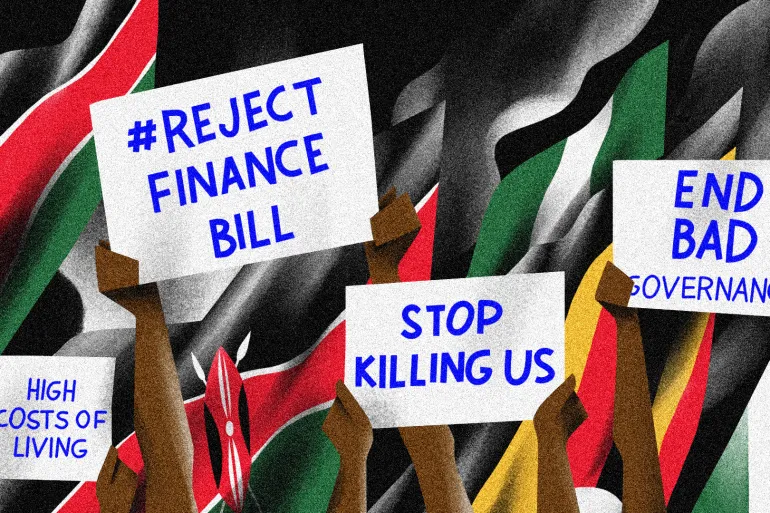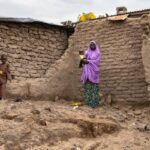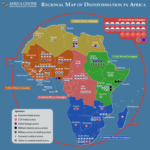Amid protests in Kenya, Uganda and Nigeria, some analysts say an ‘African Spring’ is in the making. Others say this is an incomplete story.
Not long after widespread, and deadly, protests against tax hikes rocked Kenya in June and forced a sharp government turnaround, Ugandans assembled for anticorruption protests, before Nigerians too began clamouring for demonstrations.
Many had watched captivating scenes on social media and on Kenyan news channels showing demonstrators storming the Parliament Building in the capital Nairobi on June 25. As lawmakers scampered into hiding, the angry protesters set fire to the building. They seized the ceremonial mace, symbolising how power had changed hands, even as police rained bullets on them. It was a striking show of anger in a country long seen as a pillar of stability in East Africa.
Recommended Stories
list of 3 items
- list 1 of 3Is real change possible in Kenya?
- list 2 of 3Hundreds protest across Nigeria over soaring cost of living, fuel prices
- list 3 of 3Is a sub-Saharan ‘African Spring’ in the offing?
end of list
On the opposite end of the continent, popular resentment for the Nigerian government threatened to erupt. Africa’s biggest economy has been brought to its knees in the past year as it scrapes through one of its worst economic crises. Under President Bola Tinubu, food prices have tripled, and many people are forced to reduce their meal rations or go hungry. In August, tens of thousands of people across the country took to the streets for 10 days, denouncing high living costs in protests tagged #EndBadGovernance, amid tear gas and bullets.
Days before Nigerians raged in the streets, police authorities swooped down on scores of young Ugandans who gathered in Kampala on July 23, raising placards denouncing corruption and calling for the sacking of problematic government officials. President Yoweri Museveni had banned protests before the action, warning agitators that they were “playing with fire”, and police sealed off all access roads to the parliament building. But the demonstrators gathered anyway. Some are still in detention.
Advertisement
The timing of the multi-country agitations, the palpable anger of the young people leading them, and the brutal responses by their governments have held the world transfixed. The seeming linearity of the events is prompting speculation that the wheels of something much bigger are already turning.
Some are asking: Has Kenya’s unusual fury triggered an African uprising?
The short answer: Experts are split. While some point to a connection between the three movements and other protests that have rocked other African countries in recent months, others say protests in a handful of countries cannot describe the situation across the continent. What they agree on though, is that Africa’s youth are angry and will continue voicing their dissatisfaction.

An ‘African Spring’ in the making?
Tunisian vegetable seller Mohammed Bouazizi’s self-immolation – out of frustration for being mistreated by security officials – was the spark that set the Arab world on fire in 2010, and kickstarted the uprising now known as the Arab Spring.
Tunisians, already angry at the rising cost of living, poured into the streets in angry weeks-long protest, forcing President Zine El Abidine Ben Ali, who’d led the country for 23 years, into exile. The demonstrations, aided by social media, spread like wildfire to other parts of North Africa and the Middle East, from Syria to Mauritania, as people protested not just hunger but autocratic rule. By the end, four rulers were deposed, while some regimes survived.
“The current situation in Kenya reminds me of the early days of the Tunisian uprising,” analyst Tafi Mhaka wrote on Al Jazeera. Like during the Arab Spring, social media has been crucial in recent protests, with young people mobilising on Twitter and TikTok and then taking those campaigns into the streets, motivated by shared feelings of betrayal by the political class.“More than 10 years later, I suspect the same may now be happening in sub-Saharan Africa,” Mhaka added.
There are parallels between the early days of that revolution and the dissent manifesting in parts of Africa now, said Inge Amundsen, a researcher with Norway’s Chr Michelsen Institute. Like the Arab Spring, the protests shaking up Nigeria, Uganda and Kenya are primarily triggered by tough local economic conditions, but are also broadly against corruption and misgovernance, he said.
“Young people see the social and economic differences between those at the top and [themselves], the lack of opportunities for the majority,” the researcher said. “The rich people at the top, they’ve sort of pulled up the ladder, so there is no way for others to gain the same advantages.”
Protesters in Nigeria have pointed to plans by the government to buy President Tinubu a new jet, and the recent renovation of the vice president’s residence at 21 billion naira ($13m), as points of frustration.
In Kenya, politicians, who are among the highest paid in the world, regularly flaunt their wealth on social media – something akin to rubbing salt into wounds in a country that suffered eight years of drought until 2023, and where there’s a grating lack of jobs for young people. This has also fuelled public anger.
As demonstrators started to demand that President Ruto, along with a host of his cabinet members, resign in July, they also targeted the property of MP Zaheer Jhanda who had posted videos of his fleet of luxury rides in the past.
“Why would you show us your lavish lifestyle and still not do your job as a leader,” activist Rachel Stephanie Akinyi told the Reuters news agency at the time. “What are you trying to show us? ‘We have the power to use your money the way we want to, to take care of our own needs.’ But what about us?”

An incomplete story
Although there may be some similarities between the issues in different countries, some analysts say there is limited evidence that the recent protests are linked and that the narrative of an African Spring in the making does not tell a complete story.
For one, only three countries out of 54 on the continent are being referenced, and used to paint a blanket account of the entire continent, said Chris Ogunmodede, a political analyst focused on West Africa. That Nigerian protesters had taken direct inspiration from the Kenyan demonstrators is also contestable, he said, largely because Nigeria had seen pockets of protests before the August marches, even if they were not visible to an international audience.
“I don’t buy it one bit,” Ogunmodede said of the claims of an African uprising, adding that protests on the continent are not new or unique if one takes a longer view of history.
“When it comes to Africa, there’s a tendency for people to pull threads that don’t exist, forgetting that these are very different societies with very different political systems. If all you have is ‘some folks in Nigeria saw some protests and started theirs’, I could easily extend that to Bangladesh … I think we ought to be careful when we draw broad generalities because it becomes this cascade effect where everyone is reinforcing what the other is saying.”
Widespread protests have been erupting across Africa in the past decade, but have received limited international visibility, analysts said, because of the linguistic divisions on the continent that harken back to colonisation, and ensure Francophone and Lusophone countries are less visible to English speakers.
In Algeria, protesters marched for months straight in 2019, under the Hirak or revolution marches, after 20-year President Abdelaziz Bouteflika moved to run again. Burkinabes, under La Balai Citoyen or The Citizen’s Broom movement, sent the dictator Blaise Compaore scampering from the country in 2014. Sudan’s Omar al-Bashir was ousted after months of street protests in 2019. More recently, in May, police tear-gassed protesters demanding lower living costs in the Republic of Benin, and arrested trade union members. In Angola, the opposition National Unity for Angolan Revolution Movement (UNTRA) has been organising cost of living protests since 2023, with several of its members arrested.
“When people say there’s an African uprising now, what they mean is there’s an increase in Anglophone protests, but even that is a difficult statement to make,” said researcher and author Nanjala Nyabola. “I reject these narratives … There’s an oversimplification of Africa because people want Africa to be straightforward, but we are entitled to local context and we do have our histories.”
Local nuance helps people understand why protests are much less tolerable in Kenya than in East African neighbour Burundi, for example, Nyabola pointed out. Nairobi has close ties to the United States and has been engulfed in Washington’s “war on terror” since al-Qaeda’s 1998 bombing of the US embassy in Nairobi. “That’s why the Kenyan police killed so many people, they didn’t have any reason to shoot protesters, but Kenya has been highly securitised,” she said.
At least 50 people died in the protests, according to the government-funded Kenya National Commission on Human Rights. Many are missing.
Generalisations that are quick to be imposed on Africa don’t often apply to other continents, Nyabola added. The far-right anger sweeping Europe at the moment, for example, was not always recognised as such.
“It took so long for people to call what was happening in Europe a continent-wide thing. And you can fit Europe into Africa several times,” she said.
Amundsen of the Chr Michelsen Institute echoed that argument. While successful protests like those in Kenya could have contagion effects, there are usually unique local triggers, he said. “Agitations about political corruption are usually add-ons. The closer the trigger is to what people feel in everyday life, the more important it is – and this isn’t just in Africa. It’s odd to speak about Africa in this context, we live in a global world and Africa is not isolated from anything.”

Africa’s year of anger?
Although experts differ on how to classify the recent wave of protests, what’s undeniable, they say, is that young people, in Africa and around the world, are getting angrier and that the fury will continue for a long time.
Researcher Nyabola linked the anger back to the “great time discontinuation” she said followed the COVID-19 pandemic, and that caused most people’s lives to change in ways that many governments, especially in Africa, are not acknowledging. The repressions of that time, she said, have compounded and are now manifesting on the streets. It’s especially hard for African youth, who make up 40 percent of the continent’s population, but who have limited job opportunities, she said.
“There’s been this big mental reset, this big seismic transformation, because we endured this collective trauma. Our economies fell apart, people lost their jobs, and teenagers finished school on their mobile phones. Now, it’s almost like the exhalation is beginning, and we’re now like, okay, here it comes … I think young people are about to get very upset.”
The chaos in Nairobi as protesters stormed Parliament in June was similar to scenes from Bangladesh in early August when student-led agitations saw the ousting of 15-year ruler Sheikh Hasina. After she fled into self-imposed exile on August 5, protesters ransacked and looted her official residence.
African and Asian countries were part of a similar, shared anger in the 1950s. Colonised countries were demanding independence and took inspiration from each other, as well as from the US civil rights movement that was unfolding at the same time. The black star in the Ghanaian flag was borrowed from the Black Star Line, a shipping company belonging to Jamaican-American anticolonial activist Marcus Garvey. By the end of 1960, or the Year of Africa as it’s now known, more than a dozen African and Asian countries were liberated.
Protest movements are again inspiring one another, and African agitators are not left out, Nyabola said. “There’s a much more global phenomenon taking shape. You see Kenyan protesters with toothpaste under their eyes to [neutralise] tear gas – that was borrowed from Palestinian protesters who taught Black Lives Matter protesters,” she said, referencing the protests that shook the US after police killed Black man George Floyd in 2020.
A whole new set of protest strategies have emerged that are unique for a generational “coming of age” shift that’s being witnessed, analysts said. Past protests in Kenya and Nigeria have usually had political or tribal undertones, and would usually be led by a popular political opposition leader at the helm. But in recent years, as in Nigeria’s 2020 #ENDSARS protests, young people who have largely led protests are diffusing leadership, making it hard for officials to intimidate any one leader. In June, young lawyers assembled in Kenya to help bail out those arrested, and doctors trooped out to help the wounded.
Social media, too, is serving not only as a visibility and mobilisation tool but also as an educational one. It helped Kenyans deploy ChatGPT to translate the controversial finance bill into local languages, for example.
But just as protesters are innovating, governments are coming up with playbooks to counter this new age of agitations, analysts said. In particular, they are weaponising the internet.Nigeria, Kenya and Uganda all witnessed partial internet restrictions at the peak of the protests, according to internet monitor groups. And in countries like Tanzania, it is now standard that internet speeds are slowed during elections, monitors say.
“Power too is learning from power,” Nyabola said.

https://imasdk.googleapis.com/js/core/bridge3.720.0_en.html#fid=goog_1204044412Play Video




